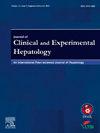人工智能在肝病中的挑战和未来展望:打破障碍,实现更好的护理
IF 3.2
Q2 GASTROENTEROLOGY & HEPATOLOGY
Journal of Clinical and Experimental Hepatology
Pub Date : 2025-04-14
DOI:10.1016/j.jceh.2025.102579
引用次数: 0
摘要
人工智能(AI)提供了一个令人信服的机会,通过从预测建模到患者特异性临床决策支持系统的无数新方法来彻底改变肝病学的实践。虽然人工智能无疑将在未来几年改变临床实践,但人工智能的实施仍面临一系列不断变化的挑战。在这篇综述文章中,我们解决了采用人工智能的技术和利益相关者的障碍,以及如果这些障碍得不到解决的潜在影响。我们强调策略,以减轻这些潜在的陷阱和需要前瞻性研究,以确认模型的有效性。最后,我们展望人工智能在临床实践中的未来对患者和临床医生的意义。本文章由计算机程序翻译,如有差异,请以英文原文为准。

Challenges and Future Perspectives for Artificial Intelligence in Hepatology: Breaking Barriers for Better Care
Artificial intelligence (AI) presents a compelling opportunity to revolutionize the practice of hepatology through a myriad of novel approaches ranging from predictive modeling to patient-specific clinical decision support systems. While AI will undoubtedly transform clinical practice in the coming years, there remains an evolving set of challenges to the implementation of AI. In this review article, we address technical and stakeholder barriers to the adoption of AI and potential repercussions if they remain unaddressed. We highlight strategies to mitigate these potential pitfalls and the need for prospective research to confirm model validity. Lastly, we look to the future of what AI in clinical practice will mean for patients and clinicians.
求助全文
通过发布文献求助,成功后即可免费获取论文全文。
去求助
来源期刊

Journal of Clinical and Experimental Hepatology
GASTROENTEROLOGY & HEPATOLOGY-
CiteScore
4.90
自引率
16.70%
发文量
537
审稿时长
64 days
 求助内容:
求助内容: 应助结果提醒方式:
应助结果提醒方式:


